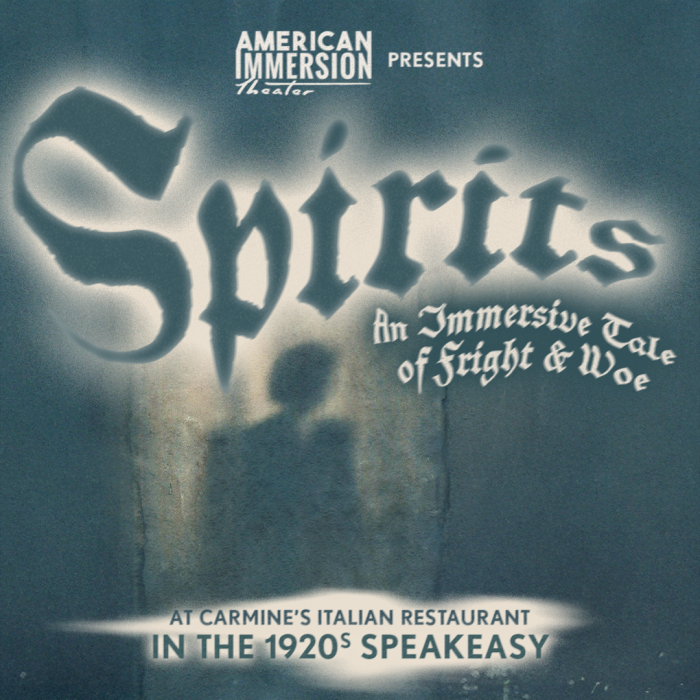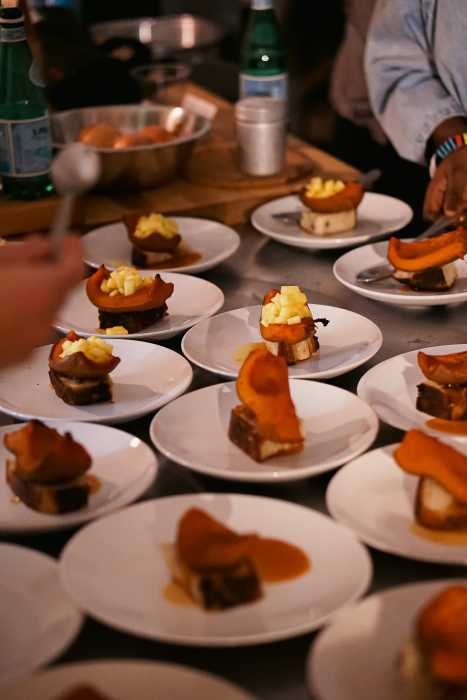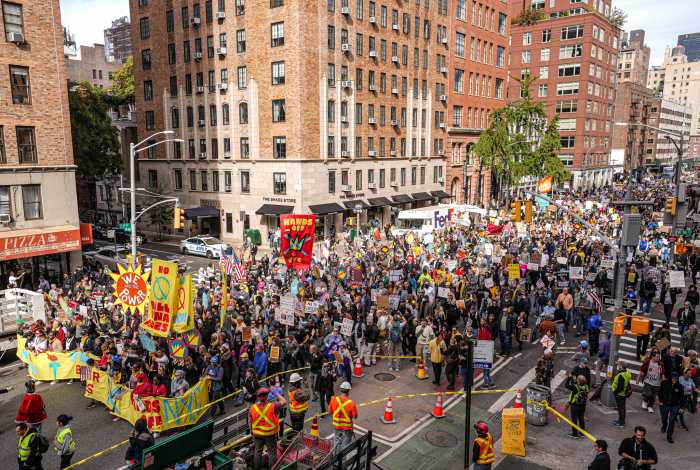The message at the Pennsy, the new food hall atop Penn Station, is clear. | THEPENNSY.NYC
BY DONNA MINKOWITZ | Under normal circumstances, my reaction to the news that a new artisanal food hall had opened in the city might be rage. In the extraordinarily beautiful river park next to Battery Park City, new kids in town Le District and Hudson Eats are revoltingly overpriced and offensively underwhelming. ($15 for bad, small “Skinny Pizza?” $12.50 for a teeny bagel with a tiny bit of beet-cured lox at Black Seed?) And they replaced the perfectly good, cheaper eats you used to be able to enjoy in that complex (Brookfield Place) while looking out at the shimmery Hudson and listening to interesting free music and performance art.
I like the food at Brooklyn Flea, but its bigger offspring, Smorgasburg, is too crowded to enjoy, with diners competing madly for savviest-foodie-hipster status and for a sadistically small number of seats. (As with David Chang’s deliberately painful seating at his Momofuko restaurants, upscale food promoters are trying to train diners to accept ever-smaller and more uncomfortable spaces as the value per foot of city real estate goes ever up.)
Marcuse coined the phrase “repressive desublimation” to mean the pleasures that consumer culture promises you, only to have the supposed ecstasies of the Berkshire pork taco (say) vanish as soon as you take the first bite. Pleasures fade exactly this quickly at the Gotham West Market, the Plaza Food Hall, Chelsea Market — all the carnivals of fake-bacchanalian fressing. It’s easy (if you’re not poor, that is) to be swept away with excitement by the sight of all that quivering, umami, gleaming, exciting food. Smoked whitefish with rice from Ivan Ramen! Hibiscus doughnuts from Dough! Popsicles made from cherry blossoms! Wow! But when you finally eat them, the revolutionary pleasures they seemed to offer are compressed out of all existence by the crowded, uncomfortable, competitive space, the lackluster culinary skills of the food workers, and the pressures of doing what is in effect the unpaid job of Instagramming, tweeting, and blogging about the hyped-up food you just ate. In an age when it’s mandatory to have social media profiles and to build your personal status by any means necessary, we pay once for the artisanal grub and then a second time, by promoting it for free.
Nor at the Pennsy, Penn Station’s new yuppie food hall
There’s more. Alyssa Katz, an editorial writer for the New York Daily News who has covered real estate for decades, says luxury developers are using the upscale food halls and festivals to escalate gentrification in their neighborhoods. “There’s been a very deliberate investment by these developers” in yuppie food hubs, she says, for the express purpose of luring high-income tenants and buyers. In fact, Smorgasburg owners Jonathan Butler and Eric Demby say they were invited to set up shop on the Williamsburg waterfront by real estate developers who “were trying to sell [apartments in] their buildings.” And Uprose, Sunset Park’s anti-gentrification group, has sharply criticized Industry City, the “disruption hub” in Sunset Park whose food hall (including a Smorgasburg) is spurring yuppie relocation that will lead to the displacement of thousands of low-income Sunset Parkers.
Which brings me to the city’s newest food hall, the Pennsy. It’s a yuppie gastro-hub that has somehow opened on top of Penn Station, which could be described as the stinking asshole of New York City. In that benighted neighborhood, the brain-killing giant neon billboards make you want to die even more than the ugly, dark, and dirty confines of Penn Station underneath. In the station, of course, there is no food that could even be called tolerable, stranding the 600,000 who enter it daily to use Amtrak, the LIRR, and New Jersey Transit.
If ever there was a place in need of nurturing food, this would be it. The Pennsy is perched on top of the station’s entrance, on the slightly raised ground floor of the big building atop Penn Station’s rat-warrens. There’s a banner in the window noting that Pat LaFrieda (the king of trendy chopped-meat blends) has a sandwich stall inside, and a huge sign reading “EAT DRINK REPEAT.”
The first thing I noticed was that it is really nice inside, much nicer than most of the other food halls. There are actually fresh flowers on the tables (yellow lilies with blood-red streaks, on one occasion), and smiling greeters who truly made me feel welcome.
About those greeters, however: one of their functions is surely to keep away the visible homeless and other scruffy folk who can be found right outside the Pennsy’s doors, both within Penn Station and on the plaza outside it. Mary Giuliani (no relation to Rudy), a caterer who has developed the food hall in association with realty giant Vornado, told me that the hall is “Vornado’s attempt to start the change in the neighborhood.” The company owns a great deal of real estate nearby, she said, including the building that the Pennsy sits in.
Giuliani said she and Vornado were also thinking of the $20 billion Hudson Yards development when they created their foodie plaza, which is just two blocks away from that elite complex. Hudson Yards, which has such very wealthy tenants and anticipated condo buyers that that the place already has its own operational subway stop even though none of the residences has yet opened, is “the largest private real estate development in the history of the United States,” according to its developer.
To be fair to Giuliani, who owns the catering and lifestyle company Giuliani Social with her husband, Ryan, she also said she is making an effort to have the place be “cool but very inclusive” and maintain “diversity.” Said Giuliani, “Looking around at lunch one day, I saw all walks of life.” In a limited way, she has a point. While the poor (and, for that matter, most Penn Station travelers) are not buying food at the Pennsy, the hall was partly intended to draw attendees from events at Madison Square Garden. And though ticket prices at the Garden are stratospheric, people who are not wealthy have been known to pay them on occasion to see sports and concerts. They could do worse than to repair to this sandwich-and-vodka hall afterwards (a large bar anchors the Pennsy, along the back wall).
A note about logistics, however: the charming table-and-chair clusters provide wonderfully sufficient seating for lunch and dinner, but they would definitely be overwhelmed by the rush of people after a Knicks game. And there is a weird state of affairs with the bathrooms: they are hard to find, all the way at the back and then up an elevator or escalator. Even stranger, there are only two stalls in the women’s room. I saw cleaners there all the time, but one stall had a persistent smell of urine over several visits.
The half-welcoming, half-unwelcoming aspect of the hall (the bathrooms are surely situated remotely to keep homeless folks away) jibes with the reason an airy, friendly food mecca has suddenly opened on top of this disgusting transit hub. When is it that services suddenly appear out of nowhere in this city? When rich people are about to move in who, it is hoped, are in need of them.
So much the worse for them. As it happens, most of the food here isn’t very good. When I ate at the Cinnamon Snail’s astounding vegan food truck in the past, I found it magical. But here (where the chef, Adam Sobel, told me he rarely appears), a Beastmode Burger Deluxe ($10.95), made of “ancho chili seitan” grilled “in maple bourbon bbq sauce with jalapeño mac n cheese, arugula, smoke chili coconut bacon, and chipotle mayo,” tasted distressingly like a Big Mac. It was overwhelmed with something that tasted an awful lot like “special sauce” (the “chipotle mayo,” not spicy at all but plenty sweet). The mac n cheese bits, scattered on top of the burger, were the best part, though they didn’t taste of jalapeño. The Thai BBQ Tempeh with pickled red onions, Thai basil, and sriracha mayonnaise wasn’t much better. It was swimming in a different teeth-achingly sweet sauce ($9.95, plus $2.80 if you want it served over red quinoa pilaf instead of bread). But almost all the Cinnamon Snail’s food is organic, and some of the vegan doughnuts are outstanding.
At Pat LaFrieda, things were worse. Grandpa’s Meatball Sandwich ($12) tasted like something I might have gotten at my high school cafeteria. I didn’t try the lobster sandwich at the Lobster Press booth by the famous chef Marc Forgione, because it sounded like a terrible idea to press a lobster roll thin in a sandwich press and stick cheese on it ($18). But my friend’s lobster bisque ($9.25 for a small, plastic bowl) was oily, with an odd chemical aftertaste. My friend reported that he found only two chunks of lobster in the soup, and that some pieces of shell had made it into the bowl.
I didn’t get to try anything at the Little Beet, a so-called “100% guiltin’ free” booth that is part of a chain of gluten-free fast food joints. The best dishes I tried in the Pennsy were from Mary Giuliani’s own booth, Mario by Mary, for which she uses some recipes by Mario Batali as well as some of her own. The eggplant nonna ($11.02, breaded, fried eggplant with fresh whipped ricotta, scamorza, and tomato) was rich, umami, and napped with creaminess. Giuliani’s unusual rainbow cookies (called here “Venetian rainbow cake,” $3.68) were delicate and delicious. The La Colombe coffee, served at the bar in the back, was astringent and off-tasting.
The Pennsy, 2 Pennsylvania Plaza (33rd Street and Seventh Avenue); thepennsy.nyc or 917-475-1830. Hours are daily, 11 a.m. to 9 p.m., with the bar open additional hours on some days. The hall is wheelchair-accessible via a ramp at street level, and restrooms are accessible and reachable by elevator.


















